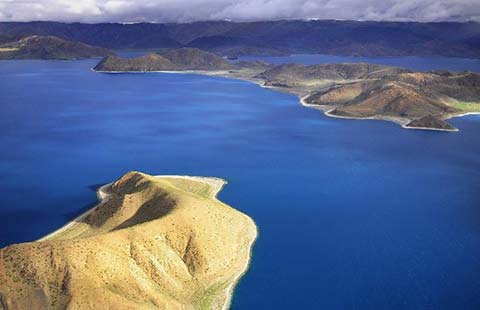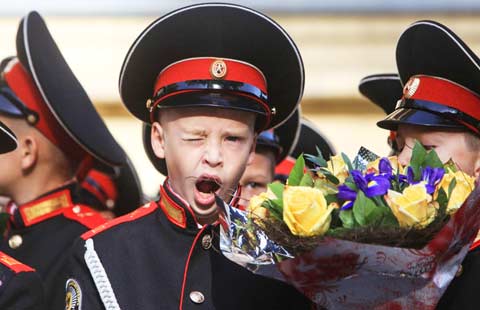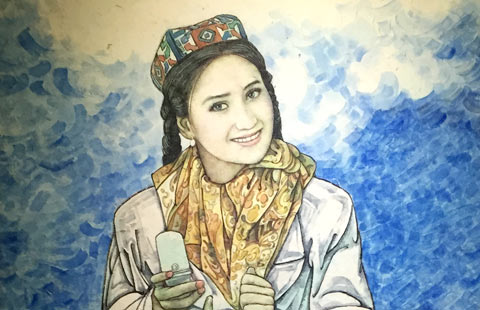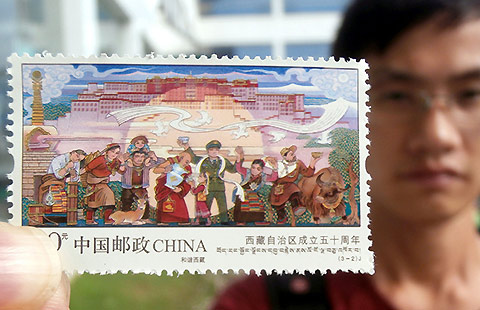White paper reaffirms living Buddha policy
Updated: 2015-09-07 07:38
By Xu Wei(China Daily USA)
|
||||||||
Beijing 'has undeniable endorsement right on the reincarnation system', document says
The central government has an undeniable endorsement right on the reincarnation of living Buddhas in the Tibet autonomous region, a senior official said on Sunday.
The comment was made as China issued a white paper reaffirming Tibet's ethnic autonomous policy ahead of the 50th anniversary of its foundation.
The official said the central government respects Tibet's history and religious traditions. The reincarnation system is an important tradition to ensure the inheritance of Tibetan Buddhism, which since the Qing Dynasty (1644-1911) has been affirmed and regulated by the central government, the official added.
Norbu Dundub from the United Front Work Department of the Communist Party of China Tibet Autonomous Regional Committee, was speaking at a news conference.
The regulation on the reincarnation system is clearly outlined in a document issued by the State Administration for Religious Affairs in 2007, he added.
"So, no matter what the Dalai Lama says or does, he cannot deny the central government's right to confirm the new reincarnation," he said.
Among its roles, the United Front Work Department is a Party organ that supervises religious affairs in China.
Norbu Dundub was responding to an interview in The New York Times in July with the Dalai Lama who said, "The CPC is pretending that they know more about the reincarnation system than the Dalai Lama."
Norbu Dundub accused the Dalai Lama of violating historical conventions and religious rituals by designating a Panchen Lama at will. "The designation is illegal and invalid," he said. The regulation states that a Panchen Lama must be confirmed by the central government.
Choekyi Nyima, now 26, was named by the Dalai Lama as the 11th Panchen Lama "against historical customs and religious rituals", Norbu Dundub said.
"This so-called 'soul boy' designated by the Dalai Lama is receiving education, living normally and growing healthily. He does not want to be disturbed by anyone," he said.
In a regulation introduced in September 2007, the State Administration for Religious Affairs said all the reincarnations of living Buddhas of Tibetan Buddhism must receive government approval.
Reincarnation applications must be submitted to the provincial Religious Affairs Department, the provincial government and the State Administration for Religious Affairs for approval based on the "fame and influence" of the living Buddhas, the regulation said.
For living Buddhas with major influence, the reincarnation application must be approved by the State Council, it said.
The Dalai Lama said in an interview with the German newspaper Welt am Sonntag in September last year that the traditional practice of reincarnation for the post could end with him, adding that Tibetan Buddhism was not dependent on a single person.
A spokeswoman for the Chinese Foreign Ministry responded by telling him to respect the historic practice of reincarnation.
The white paper, "Successful Practice of Regional Ethnic Autonomy in Tibet", condemned the Dalai Lama for "plotting toward 'Tibetan independence'."
"The 14th Dalai Lama clique, in plotting toward 'Tibetan independence', has constantly preached the 'middle way', peddled the concept of a 'Greater Tibet', and lobbied for 'a high degree of autonomy', so negating regional ethnic autonomy and its contribution to Tibet's progress," the white paper said.
According to the document, there are 1,787 religious venues and more than 46,000 Buddhists in Tibet. The region has 358 living Buddhas, of whom more than 60 were newly incarnated according to customs and religious rituals.
The white paper also said Tibet is at the best stage in its history.
Regional GDP has expanded from 327 million yuan ($51.4 million) in 1965 to 92 billion yuan last year.
The disposable income of urban residents in the region reached 22,016 yuan per person last year. For herdsmen and farmers, the figure was 7,359 yuan per person.
The region has also prioritized the protection of ecology and the environment. Tibet has 47 nature reserves covering 412,200 square kilometers, or 34.35 percent of the region's land area, the paper said.
Dorje Tsedrup, vice-chairman of the Tibet autonomous region, said at the news conference, "We can say with pride that Tibet is the only unpolluted land in the world."
Xinhua contributed to this story.
xuwei@chinadaily.com.cn
(China Daily USA 09/07/2015 page3)

 Aerial view of Yamzho Yumco Lake in Tibet
Aerial view of Yamzho Yumco Lake in Tibet
 Chinese 'blade runners' fight for sports dreams
Chinese 'blade runners' fight for sports dreams
 The world in photos: Aug 31 - Sept 6
The world in photos: Aug 31 - Sept 6
 Breath of fresh air for a 'living fossil'
Breath of fresh air for a 'living fossil'
 Learn to behave like a real noble
Learn to behave like a real noble
 50th anniversary of Tibet autonomous region
50th anniversary of Tibet autonomous region
 Red carpet looks at the 72nd Venice Film Festival
Red carpet looks at the 72nd Venice Film Festival
 China beats Russia in 4 sets at volleyball World Cup
China beats Russia in 4 sets at volleyball World Cup
Most Viewed
Editor's Picks

|

|

|

|

|

|
Today's Top News
Sarah Palin: Immigrants should 'speak American'
Germany frees up funds for refugees, speeds up asylum procedures
China 2014 GDP growth revised down to 7.3%
White paper on Tibet reaffirms living Buddha policy
China to introduce circuit-breaker for stock market
Austria, Germany open borders to migrants
Central government steps up economic support for Tibet
China economy enters 'new normal' eyeing 7% growth rate: G20
US Weekly

|

|







